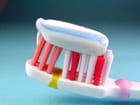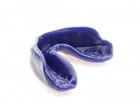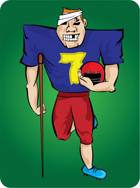 There are quite a few reasons why we suffer from sensitive teeth in the city of Leeds, but the results are always the same- mainly great discomfort and it can cause a lot of problems in our everyday lives. The most common cause is done by overzealous brushing with abrasive toothpastes that wears away at the teeth’s enamel and then gets into the nerves. The build-up of plaque can lead to acid erosion and then tooth decay and gum disease which again, break down the enamel. Grinding and over-stated tooth bleaching also have the same affects. The first way to overcome this is to pay a visit to the dentist who can rectify any decay with a filling or a root canal. Then you can have fluoride treatments or even a sealant fitted to help protect the surfaces of the teeth; those who grind their teeth can have a mouth-guard made up. Outside of the dentists, it is down to you to help quell the sensitivity; for a start you can use a softer brush and find yourself a good de-sensitizing toothpaste. Fluoride mouth-washes are also excellent at re-mineralizing the enamel in the teeth and protecting the nerves.
There are quite a few reasons why we suffer from sensitive teeth in the city of Leeds, but the results are always the same- mainly great discomfort and it can cause a lot of problems in our everyday lives. The most common cause is done by overzealous brushing with abrasive toothpastes that wears away at the teeth’s enamel and then gets into the nerves. The build-up of plaque can lead to acid erosion and then tooth decay and gum disease which again, break down the enamel. Grinding and over-stated tooth bleaching also have the same affects. The first way to overcome this is to pay a visit to the dentist who can rectify any decay with a filling or a root canal. Then you can have fluoride treatments or even a sealant fitted to help protect the surfaces of the teeth; those who grind their teeth can have a mouth-guard made up. Outside of the dentists, it is down to you to help quell the sensitivity; for a start you can use a softer brush and find yourself a good de-sensitizing toothpaste. Fluoride mouth-washes are also excellent at re-mineralizing the enamel in the teeth and protecting the nerves.






 It’s not really rocket science- the clue is in print, in the title- mouth-guard. It’s a device that does what it claims, protecting your mouth from any possible chance of injury…where it can and within reason. In the city of Leeds, mouth guards are used in all walks of life; from hospital surgery, through to dentists and sports, you’ll find them everywhere. If you play a lot of contact sports, the best way of protecting your mouth and its teeth, your jaw and your neck, they will help, at the very least, help limit the injuries that you sustain. The guard of your choice is essentially down to you, but with a little research, you can choose the right one that is tailored to the games that you play. Dentists incorporate them in many procedures. Modern styles of orthodontic procedures to correct teeth alignment veer away from traditional braces, preferring devices that are more akin to a boxer’s gum-shield. Bruxism or teeth grinding is very damaging to the mouth; gum-shields are often used to protect the teeth from unnecessary wear and tear during the treatment of the problem (they are also used in the treatment of snoring). One of the more fashionable ways a mouth-guard is used is in the field of cosmetic dentistry- teeth bleaching. The shield not only houses the bleaching agent to whiten your teeth, but it also protects the rest of the mouth being damaged by the chemicals in the bleach.
It’s not really rocket science- the clue is in print, in the title- mouth-guard. It’s a device that does what it claims, protecting your mouth from any possible chance of injury…where it can and within reason. In the city of Leeds, mouth guards are used in all walks of life; from hospital surgery, through to dentists and sports, you’ll find them everywhere. If you play a lot of contact sports, the best way of protecting your mouth and its teeth, your jaw and your neck, they will help, at the very least, help limit the injuries that you sustain. The guard of your choice is essentially down to you, but with a little research, you can choose the right one that is tailored to the games that you play. Dentists incorporate them in many procedures. Modern styles of orthodontic procedures to correct teeth alignment veer away from traditional braces, preferring devices that are more akin to a boxer’s gum-shield. Bruxism or teeth grinding is very damaging to the mouth; gum-shields are often used to protect the teeth from unnecessary wear and tear during the treatment of the problem (they are also used in the treatment of snoring). One of the more fashionable ways a mouth-guard is used is in the field of cosmetic dentistry- teeth bleaching. The shield not only houses the bleaching agent to whiten your teeth, but it also protects the rest of the mouth being damaged by the chemicals in the bleach. Living and working in the city of Leeds can be exciting but at the same time, very stressful, and stress is one of those modern problems that’s easy to overlook- and it throws up side affects that you may not notice at first. One such problem is teeth grinding and it’s an important issue to get under control, for it can cause all manner of problems throughout the upper body. A lot of pressure is put on the joints between the upper and lower jaws, but if this starts to suffer from overload, it can cause damage to the ears, the head neck, and the upper back; teeth grinding can compound the problem so there is a great need to get your stress and behaviour managed. It’s important to identify daytime stresses so that you have a chance to unwind in the evening before you go to sleep, for it’s here that most of the grinding will take place. A dentist can always supply you with a mouth guard, but that will only protect the teeth; the physical grinding will still continue and so will the pressures on the jaws. Before you go to sleep, it’s important to prepare yourself and learn to relax. You should avoid any form of caffeine and opt for herbal teas before bed; baths with essential oils, the burning of herbal oils, reading and ‘chilling out’ to calming music are excellent ways to de-stress. If you have any issues with this problem, it’s important to seek out advice from your dentist.
Living and working in the city of Leeds can be exciting but at the same time, very stressful, and stress is one of those modern problems that’s easy to overlook- and it throws up side affects that you may not notice at first. One such problem is teeth grinding and it’s an important issue to get under control, for it can cause all manner of problems throughout the upper body. A lot of pressure is put on the joints between the upper and lower jaws, but if this starts to suffer from overload, it can cause damage to the ears, the head neck, and the upper back; teeth grinding can compound the problem so there is a great need to get your stress and behaviour managed. It’s important to identify daytime stresses so that you have a chance to unwind in the evening before you go to sleep, for it’s here that most of the grinding will take place. A dentist can always supply you with a mouth guard, but that will only protect the teeth; the physical grinding will still continue and so will the pressures on the jaws. Before you go to sleep, it’s important to prepare yourself and learn to relax. You should avoid any form of caffeine and opt for herbal teas before bed; baths with essential oils, the burning of herbal oils, reading and ‘chilling out’ to calming music are excellent ways to de-stress. If you have any issues with this problem, it’s important to seek out advice from your dentist. Many of us may find ourselves in situations where our teeth need protecting. Whether we play a highly physical sport such as lacrosse, rugby, American football or boxing or indulge in activities such as mountain biking or gymnastics which can cause injuries to the mouth, our teeth can be put at risk. Some of us even have the tendency to grind our teeth during sleep. Protecting our teeth in these situations is vital to ensure that we don’t suffer the pain and inconvenience of tooth loss or chipping.
Many of us may find ourselves in situations where our teeth need protecting. Whether we play a highly physical sport such as lacrosse, rugby, American football or boxing or indulge in activities such as mountain biking or gymnastics which can cause injuries to the mouth, our teeth can be put at risk. Some of us even have the tendency to grind our teeth during sleep. Protecting our teeth in these situations is vital to ensure that we don’t suffer the pain and inconvenience of tooth loss or chipping. Dental accidents are extremely common occurrences and they can cause you a great deal of discomfort. In addition, teeth can break very easily, leading to permanent disfiguration of one’s face. A dental practice in Leeds has been educating its patients on what to do in the event of such an accident. A person has to know how to prevent damage to the mouth and also what to do in case an accident does take place so that its effects can be minimized.
Dental accidents are extremely common occurrences and they can cause you a great deal of discomfort. In addition, teeth can break very easily, leading to permanent disfiguration of one’s face. A dental practice in Leeds has been educating its patients on what to do in the event of such an accident. A person has to know how to prevent damage to the mouth and also what to do in case an accident does take place so that its effects can be minimized. There are many conditions that affect us when we sleep. Two of the most common are snoring and sleep apnea. Both of these affect the way we sleep and can cause associated health problems during the day. Another less common but also debilitating sleep disorder is known as bruxism.
There are many conditions that affect us when we sleep. Two of the most common are snoring and sleep apnea. Both of these affect the way we sleep and can cause associated health problems during the day. Another less common but also debilitating sleep disorder is known as bruxism. If you have ever suffered from a knocked out, chipped or cracked tooth you will know exactly how painful it can be. Not only is the pain immediate, but it may require months or even years of painful and costly dental surgery to repair the damage. Knocked out teeth cannot always be replaced and you may require a dental implant or bridge to artificially replace it. Chipped and cracked teeth can usually be repaired with dental bonding, but if the structural damage is too severe, it may require a crown or a veneer to prevent any further damage. All of these artificial dental substitutes will require replacing at various intervals throughout your life.
If you have ever suffered from a knocked out, chipped or cracked tooth you will know exactly how painful it can be. Not only is the pain immediate, but it may require months or even years of painful and costly dental surgery to repair the damage. Knocked out teeth cannot always be replaced and you may require a dental implant or bridge to artificially replace it. Chipped and cracked teeth can usually be repaired with dental bonding, but if the structural damage is too severe, it may require a crown or a veneer to prevent any further damage. All of these artificial dental substitutes will require replacing at various intervals throughout your life. All dentists have a keen interest in sports. Not necessarily because they enjoy them but because so many of their patients damage their teeth while playing them. Knocked out, cracked and chipped tooth have been the result of sporting injuries as long as there have been sporting injuries and all dentists are very familiar with the prop forward, or opening batsman coming into surgery clutching a knocked out tooth.
All dentists have a keen interest in sports. Not necessarily because they enjoy them but because so many of their patients damage their teeth while playing them. Knocked out, cracked and chipped tooth have been the result of sporting injuries as long as there have been sporting injuries and all dentists are very familiar with the prop forward, or opening batsman coming into surgery clutching a knocked out tooth.

